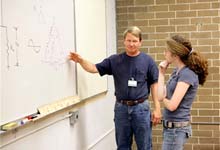|
|
 |
Program Philosophy
Over a million of the students who enter ninth grade each fall fail to graduate with their peers four years later. In fact, about seven thousand students drop out every school day according to the Alliance for Excellent Education. The dim reality is our public education system is failing our students. Our educational system does not equip our students with the essential knowledge and skill sets required to compete in today’s global economy. A number of independent researchers estimate the national graduation rate at or below 68 percent. At its peak in 1969, the national graduation rate was 77 percent.
 Each year, approximately 1.2 million students fail to graduate from high school, more than half of whom are from minority groups. Nationally, the graduation rate for white students was 78 percent compared to their African American and Hispanic peers where barely half of those students earn diplomas. But regardless of our young adult’s race, creed, color, gender, or sexual preference, the issue is our future generation and the future of our democratic society as we know it is in serious danger. Each year, approximately 1.2 million students fail to graduate from high school, more than half of whom are from minority groups. Nationally, the graduation rate for white students was 78 percent compared to their African American and Hispanic peers where barely half of those students earn diplomas. But regardless of our young adult’s race, creed, color, gender, or sexual preference, the issue is our future generation and the future of our democratic society as we know it is in serious danger.
Now focus your attention on what happens to the students who are still in school but run afoul of the public school system’s rules. What happens to these students? Have you heard of “the toilet assumption?” Philip Slater in his book, “The Pursuit of Loneliness”, identified a social current he dubbed the “Toilet Assumption.” The “toilet assumption” asserts that when society is faced with an annoying and difficult social problem, often the expedient policy of choice is to flush the problem “out of sight,” and consequently, “out of mind.” Where is that place? It’s called the “alternative school system.”
For years, educators have been faced with the challenge of an ever-growing number of disenchanted, disaffected, and disenfranchised students. These same underpaid and overworked educators who get little recognition for their efforts, have little to no time to deal with “problem” students. A number of these teachers choose to define the failure to thrive as a student disorder and decides to refer the defective student away for treatment. That is to say, they hand off the problem student to their fellow educators at the “alternative school.” In general, students are referred to alternative schools and programs if they are at risk of education failure, as indicated by poor grades, truancy, disruptive behavior, suspension, pregnancy, or similar factors associated with early withdrawal from school (Paglin and Fager 1997).
At NIYA, we have a different perspective on how to “treat” so-called problem students. Instead of taking the low road to the path of least resistance, NIYA seeks to reengage those students and create a desire to succeed not only with academic challenges but also with everyday challenges that impact their future as an adult.
Our society loves to label things, especially programs. If a child has a handicap, the program he or she attends becomes seen as the “handicap” program. If admission to a school is based upon aptitude, it is called the “gifted” program. So as you might expect, when a program is based upon serving those “who don’t fit in,” it is seen as a special program for “problem students.” This type of labeling confers a “social identity” on the student. When this identity is a negative one, the programs are seen as carrying and spreading a “spoiled image” (Polk & Schafer, 1972). That statement was made nearly four decades ago and it is still true today.
NIYA will never convey a "spoiled image" or produce a student “lifer.” At most alternative schools, on average, the rate of credit attainment lags significantly behind that achieved by students on a normal four-year graduation track. Worse yet, the academic growth made by these “remedial students” was less than one year’s growth in one year’s time (the minimum needed to catch up to their more advantaged peers). This lack of even normal rates of progress for students in remedial or special programs has been well documented in longitudinal studies of ESEA Title I (Slavin & Madden, 1989; USOE, 1989). The chronic lack of normative growth of students receiving special services is so great that some commentators have come to call these students “lifers” (Anderson & Pellicer, 1990), as they can never realistically graduate from these programs and join the mainstream.
NIYA avoids the “spoiled image” and creating student “lifers” by making educational  alternatives the norm. We follow a concept expressed by the acronym CBUPO (Competence, Belonging, Usefulness, Potency, and Optimism) (Sagor, 1993; Sagor, 1996). Intuitively, we know that students will feel positive about their future and therefore do better in school when they: alternatives the norm. We follow a concept expressed by the acronym CBUPO (Competence, Belonging, Usefulness, Potency, and Optimism) (Sagor, 1993; Sagor, 1996). Intuitively, we know that students will feel positive about their future and therefore do better in school when they:
- Understand and have an appreciation for their skills and strengths
- See themselves as a valued part of a positive group
- Feel needed and counted upon by others, and
- Empowered to make meaningful things happen in their lives
NIYA will work hard to create opportunities at our school so that every student can and will experience something new on a daily basis. NIYA’s staff is keenly aware that there does not exist any one approach that addresses all of our youth‘s issues and we continuously seek other educational alternatives for that very reason. In Steve Crabtree’s article “Do Parents, Teachers Recognize Teens’ Strengths?” he raises the issue of using standardized testing to drive education reform. This idea suggests that such testing fosters a “one-size-fits-all” approach to teaching. NIYA opposes this view and we are supported by many psychologists and educators who argue that students learn differently than others do, and specific teaching strategies should be tailored to students’ individual strengths.
NIYA will run diagnostic evaluations before any student starts their educational program. We first seek to understand what students’ strengths are. We will then tailor our learning program around the student’s strengths and weaknesses. NIYA is sincere about meeting the needs of all students while avoiding stigmatizing anyone. Every program NIYA offers strives to convey a positive image.
 Keeping students engaged in their education is one of the biggest challenges facing schools today. That’s why NIYA will hire the best faculty members in the field. Our teachers understand the importance of trust and relationships. We will conduct a mandatory seminar during the summer for all NIYA educators that focuses on discovering the interests and strengths of their students, building trust, creating a sense of safety and order, and building positive student-teacher relationships. Keeping students engaged in their education is one of the biggest challenges facing schools today. That’s why NIYA will hire the best faculty members in the field. Our teachers understand the importance of trust and relationships. We will conduct a mandatory seminar during the summer for all NIYA educators that focuses on discovering the interests and strengths of their students, building trust, creating a sense of safety and order, and building positive student-teacher relationships. |